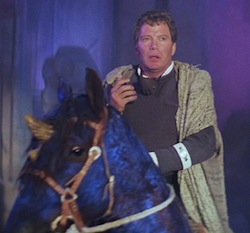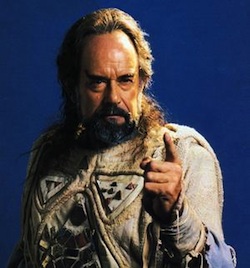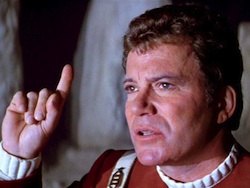If you skipped the pre-title scene and opening credits of Star Trek V: The Final Frontier and started with the Yosemite rock climbing/camping stuff you’d probably think you were in for a pretty fun movie. And in some ways, you’d be right. What’s not to like about Kirk, Spock and Bones chewing the fat and ribbing each other? Despite having a troublesome premise, a crummy plot, and transparent production problems, The Final Frontier did depict the relationship between this holy trinity lovingly while simultaneously recreating the trappings of many recurrent 60’s era Trek premises.
It also had some memorable dialogue. (What does God need with a starship, anyway?) If you view this movie like a grab bag, you’ll find yourself pulling out a lot of good stuff from what is generally considered the most derided Trek movie of them all.
It’s no secret that The Final Frontier is 100% Shatner’s baby. Not only is the movie heavily Kirk-centric, it also features Kirk doing more action-adventure oriented things than in the previous films. Granted, Kirk kicked Christopher Lloyd in the face at the end of The Search for Spock, but in The Final Frontier he runs around on rocks, rides a horse, punches Sybok in a shuttlecraft, and climbs a mountain. Speaking of which, Captain Kirk is climbing a mountain; why is he climbing a mountain?
 As this was Shatner’s first foray into creating a Star Trek story (several novels were to follow) it seems like he wanted Kirk to be a manly hero and do manly things like climbing mountains and riding horses. If you think about it Kirk is sort of like Space Hemingway and even Bones refers to Kirk’s “macho mind” in the campfire scene. This kind of makes sense, as being physically active was always a part of Kirk’s personality. In this movie Kirk doesn’t sit around and mope (Star Trek II) or ride buses in San Francisco (Star Trek IV). This is the first time since the original Star Trek film that Kirk is no longer Admiral Kirk, but Captain Kirk. It’s as though by having the character get demoted in The Voyage Home, that the clock has been turned back and he’s youthful energetic guy again.
As this was Shatner’s first foray into creating a Star Trek story (several novels were to follow) it seems like he wanted Kirk to be a manly hero and do manly things like climbing mountains and riding horses. If you think about it Kirk is sort of like Space Hemingway and even Bones refers to Kirk’s “macho mind” in the campfire scene. This kind of makes sense, as being physically active was always a part of Kirk’s personality. In this movie Kirk doesn’t sit around and mope (Star Trek II) or ride buses in San Francisco (Star Trek IV). This is the first time since the original Star Trek film that Kirk is no longer Admiral Kirk, but Captain Kirk. It’s as though by having the character get demoted in The Voyage Home, that the clock has been turned back and he’s youthful energetic guy again.
In this way, The Final Frontier IS your father’s Star Trek. However this conceit doesn’t go too far, because Kirk certainly has some baggage that he didn’t have in the original show. In fact, every member of the Enterprise has baggage, and it doesn’t take long before they all end up on the analysts’ couch. Understanding the plot of this one is ultimately secondary to being able to enjoy it. Here it is in brief; a crazy emotional Vulcan steals the Enterprise in a holy quest to find God at the center of the galaxy and only Kirk can stop him.
 Infamously, Shatner had initially approached Sean Connery for the role of Spock’s brother Sybok, but Sir Sean was busy with Indiana Jones and the Last Crusade. If you picture Connery in every single “share your pain with me” scene you can immediately imagine the Sybok character being a little bit easier to buy. As it stands, with poor Laurence Luckinbill playing this absurd character straight, Sybok comes across creepy. I genuinely don’t believe Luckinbill did anything wrong, just the opposite. If anything, he was too convincing as a totally insane religious fanatic, which made the character unlikable. We’re not supposed to like villains, but we shouldn’t be cringing either. With Connery; I suspect we would have been given a kitschy so-bad-its-good sort of thing, which probably would have been preferable. But I digress, and because there is no Connery, so the only way to really watch the movie is to ignore Sybok. Instead, focus on Kirk, Spock, and Bones as they tackle the most classic of Trek premises: our heroes versus a false God.
Infamously, Shatner had initially approached Sean Connery for the role of Spock’s brother Sybok, but Sir Sean was busy with Indiana Jones and the Last Crusade. If you picture Connery in every single “share your pain with me” scene you can immediately imagine the Sybok character being a little bit easier to buy. As it stands, with poor Laurence Luckinbill playing this absurd character straight, Sybok comes across creepy. I genuinely don’t believe Luckinbill did anything wrong, just the opposite. If anything, he was too convincing as a totally insane religious fanatic, which made the character unlikable. We’re not supposed to like villains, but we shouldn’t be cringing either. With Connery; I suspect we would have been given a kitschy so-bad-its-good sort of thing, which probably would have been preferable. But I digress, and because there is no Connery, so the only way to really watch the movie is to ignore Sybok. Instead, focus on Kirk, Spock, and Bones as they tackle the most classic of Trek premises: our heroes versus a false God.
How many times does Kirk best a false God-like entity in the classic series? When you consider the premises of “The Apple,” “Where No Man Has Gone Before,” “The Squire of Gothos,” “Return of the Archons,” “Who Mourns for Adonis?”, or “For the World is Hollow and I Have Touched the Sky” the answer is A LOT. Pulling back the curtain on inept leaders and corrupt authority figures who weren’t necessarily masquerading as gods, but were nonetheless in charge, was another of Kirk’s favorite pastimes in the original show. He does it in “Patterns of Force,” “The Gamesters of Triskelion,” “Bread and Circuses,” “A Taste of Armageddon,” and many, many other episodes. When you consider these two themes as “Kirk versus the man” it is sort of weird he doesn’t get to stick it the man in the movies more often.
In Star Trek III, Kirk goes rogue for selfish reasons to save Spock which means we don’t get a famous Kirk-lecture on why his way is the right way and why being a flawed human is so tops. In Star Trek V he gets to do this in spades. When asked to share his pain with Sybok, Kirk becomes the Kirk of old yelling, “I don’t want my pain taken away, I need my pain!” This is classic stuff! Kirk has always been a champion of being screwed up. This declaration is perhaps more true to the original character than anything he does in any of the other films. Yes, it’s over the top, yes it’s a little cartoony. But then again, so is Captain Kirk.
 In climax of the film, when the faux-god tries to pull a fast one on the crew, Kirk casually raises his hand and says, “Excuse me.” This isn’t remembered as a classic movie moment, which is too bad, because it really is great and followed up with the wonderful “What does God need with a Starship?” Here Kirk is being the mixer and iconoclast that he started out as in the original show. If you picture 60’s Kirk with a torn shirt and bloody lip doing these same lines, you’ll realize just how much this movie reminds you of Star Trek. And yes, Star Trek V is deeply, deeply flawed and as a result, full of pain for a Trek fan. But then again, just as Captain Kirk constantly reminds us: would we truly be human without all of our flaws?
In climax of the film, when the faux-god tries to pull a fast one on the crew, Kirk casually raises his hand and says, “Excuse me.” This isn’t remembered as a classic movie moment, which is too bad, because it really is great and followed up with the wonderful “What does God need with a Starship?” Here Kirk is being the mixer and iconoclast that he started out as in the original show. If you picture 60’s Kirk with a torn shirt and bloody lip doing these same lines, you’ll realize just how much this movie reminds you of Star Trek. And yes, Star Trek V is deeply, deeply flawed and as a result, full of pain for a Trek fan. But then again, just as Captain Kirk constantly reminds us: would we truly be human without all of our flaws?
Ryan Britt is a staff blogger for Tor.com. He needs his pain.









